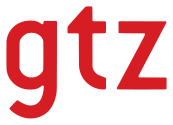German Agency for Technical Cooperation
| German Agency for Technical Cooperation
|
|
|---|---|
| legal form | GmbH |
| founding | 1st January 1975 |
| resolution | December 31, 2010 |
| Seat | Eschborn , Germany |
| management | Christoph Beier, Bernd Eisenblätter , Hans-Joachim Preuss |
| Number of employees | approx. 13,000 (2008) |
| sales | 1.2 billion euros (2008) |
| Website | www.gtz.de |
The German Society for Technical Cooperation GmbH (GTZ) was founded on January 1, 1975, and was a global company for international cooperation for sustainable development ( development cooperation ). When this company was founded, it was a merger of the former Federal Agency for Development Aid (BfE) with the German Development Agency for Developing Countries (GAWI) under the leadership of the then Development Aid Minister Egon Bahr . The Federal Republic of Germany was the sole shareholder of the non-profit company . GTZ was based in Eschborn near Frankfurt am Main . She also had offices in 87 countries and carried out projects in over 120 countries around the world.
GTZ, the German Development Service (DED) and the education organization InWEnt signed a merger agreement in Berlin in December 2010 that merged them to form the new German Society for International Cooperation (GIZ). On January 1, 2011, GTZ was merged into this new company.
tasks

GTZ's main client was the Federal Ministry for Economic Cooperation and Development . There was a general contract between the Federal Government and GTZ, which obliged GTZ to carry out the BMZ's orders within the framework of technical cooperation (TC).
The TC was reserved to expand and build support structures. In this context, GTZ was particularly responsible for providing or financing the following services:
- the use of skilled workers,
- the preparation of studies,
- the delivery of material goods as well as the construction of plants and buildings, provided that the BMZ considered a direct service to be appropriate, and
- Financial contributions.
Investments in fixed assets and extensive deliveries in kind could only be processed in the form of financial contributions from TC if they were directly related to the goal of the TC projects, supplemented them and / or were a necessary prerequisite for their implementation and objectively subordinated themselves. Otherwise, this financing was reserved for Financial Cooperation (FC).
The organizational form as a company under private law also made it possible, with the consent of the Federal Government , to act directly on behalf of third parties (e.g. international organizations such as the World Bank , EU , UNHCR or the developing countries themselves) (GTZ International Services) without the Federal Government participating financially or shared responsibility for the project.
KfW and GTZ cooperated in country-specific and cross-project technical cooperation and in so-called cooperation projects . These were projects in which FC and TC measures were directly related and for which, due to their nature and scope or because of the specific expertise, joint implementation by both development cooperation institutions was appropriate.
As a non-profit corporation (corporation), GTZ was not allowed to distribute the profits it generated to the shareholders. Profits were used exclusively for purposes of development cooperation (so-called own measures).
GTZ carried out 2,300 development projects and programs in 126 countries (as of 2005).
Employee
When it was founded, the workforce consisted of 1,875 employees, members of the former BfE and GAWI. In the last few years before its dissolution, the company employed around 13,000 people, around 9,000 of whom were local workers (“national staff”). The GTZ was represented in 87 countries with its own offices. In addition, around 1,000 people worked at the headquarters in Eschborn near Frankfurt am Main.
Amalgamation
On January 1, 2011, GTZ, DED and InWEnt merged to form the German Society for International Cooperation (GIZ) .
Others
GTZ was a member of BioFrankfurt , a network for biodiversity.
In October 2010, the GTZ was selected as the “most bicycle-friendly employer in Germany” in the category of large companies in a competition organized by the Federal German Working Group for Environmentally Conscious Management (BAUM) eV.
Web links
- Official website
- Training for All Intro of a documentary about GTZ in Uganda
- Colossus of Help Article in the TIME
- Information on GTZ in the Lexicon of Sustainability
